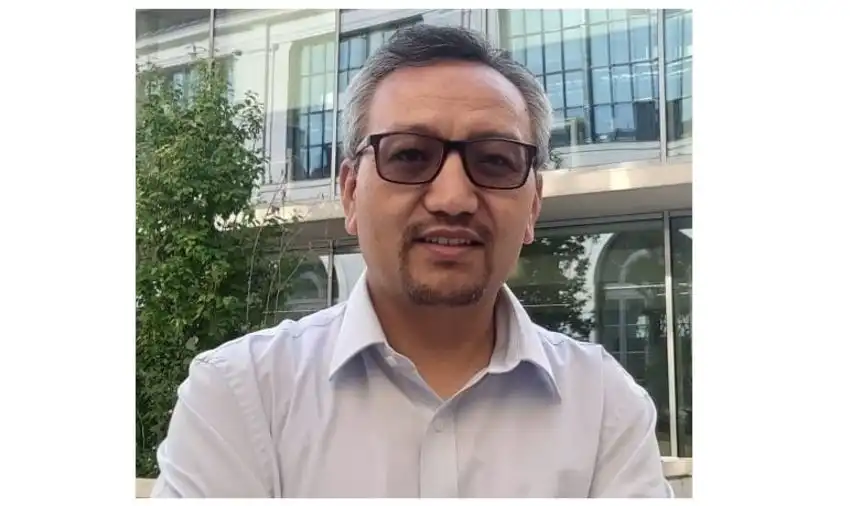Home>Meeting with Pr Ahmad-Reza Sadeqi
28.04.2022
Meeting with Pr Ahmad-Reza Sadeqi
Ahmad-Reza Sadeqi is Professor at Kateb University of Kaboul and Visiting Professor at Sciences Po Law School (2021-2023). Discussion on his background, his stay in France and his plans for the future:
CAN YOU DESCRIBE YOUR ACADEMIC AND PROFESSIONAL BACKGROUND?
I was born in Bamyan province, Afghanistan. Bamyan is known for its Buddah Statues which were destroyed in early 2000s by the Taliban Regime. Like many Afgahns, I was displaced to Iran and continued my higher education there. After the collapse the Taliban, I returned to Afghanistan with the ambition and motivation to serve the community; I started my professional work in Bamyan as a Human Rights Assistant in United Nation Assistant Mission in Afghanistan and as lecture in Bamyan University in 2003. In 2012 I received my master’s in Criminal Law from Ferdowsi University of Mashhad in Iran. Soon, I started lecturing at private universities in Kabul, including Kateb University, Avicenna University and Gharjistan University.
After a few years of teaching, I went to Iran again to continue my postgraduate studies in criminal law. In 2019, I obtained my Ph.D. in criminal law and criminology from the University of Qom. My PhD dissertation topic was "Regionalization of Criminal Policy on Organized Crimes in ECO". While studying for the doctorate degree, I continued teaching at private universities.
I began supporting the development sector in human rights through the work with the International Development Law Organization (IDLO), Asia Foundation, United Nation development Program (UNDP), and Justice Sector Program (JSSP). One of the most important national programs which I have been part of was the drafting of a new penal code for Afghanistan. I played an integral role in preparing and complementary a serious penal code of Afghanistan.
I have also participated in national and international scientific conferences, including the International Conference on the Interaction of Sharia and Law at the University of Tehran as a representative of Afghanistan. I presented the issue of the interaction of sharia and law in the criminal legislation of Afghanistan.
THIS ACADEMIC YEAR, YOU ARE A VISITING PROFESSOR IN SCIENCES PO LAW SCHOOL, CAN YOU TELL US MORE ABOUT YOUR STAY?
After the arrival of the Taliban in Kabul, my family and I, with the cooperation of the PAUSE program and Sciences Po, managed to leave Kabul, and we sincerely thank and appreciate the cooperation of both relevant institutions and administrative bodies.
My program at Sciences Po includes two areas: First, research on the issue of ongoing impunity in Afghanistan, which addresses the issue of peace, justice and transitional justice.
For years, Afghanistan has been the victim of widespread violence and crimes against humanity, war crimes and genocide, especially against ethnic and religious minorities such as the Hazaras. However, the investigation on such horrendous crimes has never been noticed nationally or internationally particularly bringing the perpetrators to the justice.
The second axis of my cooperation here includes participation and cooperation in scientific and seminars of Sciences Po. So far, I have participated in the seminar as a discussant on Waging War Through Law (the Taliban Courts in Afghanistan). I have also been a presenter a the class of Professor Horatia MUIR WATT and in the near future is scheduled to have a seminar for law school colleagues.
WHAT ARE YOUR PLANS FOR THE FUTURE?
In the first step, I intend to complete my research "Ongoing Impunity in Afghanistan" and share the results with the scientific community. In addition to the activities mentioned in Sciences Po, I will develop academic relation and cooperation with other scientific institutions based in Paris, Afghanistan and Iran.
For example, I will publish an article entitled The Challenges of Regionalization of Criminal Policy in the ECO, which is part of my doctoral dissertation entitled The Regionalization of Criminal Policy on Organized Crime in the ECO, for the Journal of the Archive of Criminal Policy in France.
WHAT ADVICE WOULD YOU GIVE TO STUDENTS OF THE SCIENCES PO LAW SCHOOL?
Sciences Po is an institution with high scientific credibility and has provided an excellent platform and facilities for scientific and academic growth and prosperity. My advice to students is to appreciate the time and facilities provided and make the most of both time and facilities, Which, of course, was and will be based on the knowledge I gained.
Published researches:
- Legislative Criminal Policy of Afghanistan on Administrative Corruption Crimes (Book)
- Regionalization of Criminal Policy in Organized Crimes (Best Published research book, 2020, ALSPA)
- Penal Code Commentary (Member of Commentator Committee, Asia Foundation2020)
- Penal Code Commentary (Member of Commentator Committee, Andisheh Foundation 2021)
- Criminal Support of Land Ownership in Afghanistan, supported by French International Research and Studies Centre, and was presented at the conference “Land and war” in November 2012 in France.
- Joint Regional Criminal Policies, An Effective Factor in Preventing Narcotics Crimes, published on Adalat Magazine, vol. 86, 2010.
- Self Defense in Afghanistan Criminal system, published on Adalat magazine, vol. 88, 2010.
- Multiplicity of Crime in Afghanistan Criminal Law, published on Adalat magazine, vol. 87, 2010.
- A Glimpse on Bribe Crime in Afghanistan Criminal Law and Anti-Corruption International Convention.
- A Preamble on Concept of Criminal Policy, published on Adalat magazine vol. 90, 2010.
- Criminology Theories on Narcotics Crimes, published on academic magazine “Ketab-eSina”, first edition, 2011.
- Preventive Participatory Criminal Policy, a Forgotten Element in the new Counter Narcotics Law, published on Adalat magazine, 2011.
- Principles of Executing Had Penalty in Afghanistan, published on Human Rights Center magazine of Kateb University, vol. 1, 2013.
- Regional Criminal Policy on Organized Crimes, Journal of Afghan Legal Studies, Volume 2, 2017.
- Human Dignity, New Afghanistan Criminal Policy Strategy in the Penal Code, Andisha , Vol 3, No 10, 2019.
